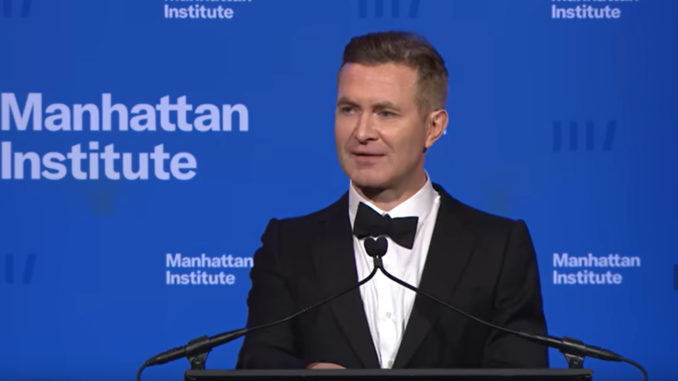Douglas Murray dedicated his Hamilton Award to the people of Israel for their national response to the October 7th massacre.
INN | May 14, 2024
British author Douglas Murray was honoured with the Hamilton Award recently, and in his speech mentioned the October 7th massacre and the resultant Swords of Iron War.
“On the 8th of October I went down to Times Square, and there were these men and women waving signs celebrating the massacre of the previous day. They weren’t calling for a two-state solution,” he said.
“A couple of things were obvious – that I had to get to Israel as soon as I could, and that we were going to see a kind of Holocaust denialism in real time.
“I went and saw the massacre, the hospitals, the wounded, the morgues where they identified the dead. I also had the opportunity to witness Israel’s response – unlike some countries today Israel doesn’t just sit back with when it’s attacked, much as some of the world would like it to do. I felt rather proud actually to go back through that fence with the IDF when they were going into Gaza in search of the hostages. I saw the tunnel networks that Hamas has spent all these years building with your money and mine. I was the first person allowed in to see the Hamas terrorists who’d committed the atrocities in the prison cells in which they’re held.”
Murray added “I think often of the line from Deuteronomy 11:26, when God says ‘I’ve set before you life and death, blessing and curse. You shall choose life, that you and your descendants might live,’ and of the Psalmist 118:17 who said, ‘I shall not die but I shall live.’ When I think of October 7th now, I don’t only think of the victims, I think of the extraordinary heroes.”
“A young man who’s a friend of mine in his 30s woke up in Jerusalem and realized what was going on. He got into his car and drove south. He collected some guns, left a farewell message to his children and his wife on his phone, and then got a call from his company commander saying, ‘You have to come back to base in Jerusalem.’ He said ‘No, we’re needed in the south now.’ His commander said, ‘Are you defying an order?’ He said, ‘I’m defying an order. We’re needed in the south.’ He fought for the next forty-eight hours and survived.”
“I think of my friend Moshe, now my cameraman. The first day we were together, we donned our armor and helmets on the Gaza border, and I noted that he had a bullet mark down the top of his helmet. He explained that it was from the 7th – he every Saturday would go down to see a friend of his and he drove right into the middle of the firefight on the highway. He got out and killed three terrorists with his own gun that he carries. He fought for the next two days. He doesn’t expect any applause, he just did what he had to do.”
He continued, “I think of the Druze men from the Supernova festival, who I met a few months ago. They described to me not just what they’d seen, which the world was already trying to deny, but what they’d done. They didn’t see themselves as heroes at all, but because they could understand Arabic, they saved so many young Jews that morning. They’re proud Israelis, and they say Hamas hates them even more than they hate the Jews.”
“I think of the Muslim doctor who Hamas held as a human shield at one point, who even after being wounded saved the lives of other Israelis.
“I think of the extraordinary people of United Hatzalah. I spoke to the head of that organization in Jerusalem, and he said in thirty years of doing this job, there wasn’t one minute like that morning.
“I think of a young woman called Adi. She was 23, and she decided she had to go and reenlist after the 7th. Her parents begged her not to, but she said she had to. She was killed on her first day. Her parents shared with me the note that she’d left for them in case she didn’t make it, and in it, she said – among other things – how sorry she was, but she said she wanted to live life, and now she wanted them to live it for her.”
Murray recalled, “I think finally of the extraordinary evening in November last year. I was at the Schneider Children’s Hospital when the helicopters came, returning the first hostages. We’d been waiting for them for two days. When the helicopters emerged in the night sky and the people of Tel Aviv realized what was happening, every car stopped. I was standing right on the top of the hospital and suddenly I noticed there was applause from the citizens, and then there was singing in the streets of Tel Aviv. I learned afterwards that there was intense competition among the helicopter pilots to have the honor of returning these children home.”
“There’s millions of stories like this across Israel. I spoke some months ago with an older guy in Tel Aviv, who said to me he’d fought in the 1967 and the 1973 wars, and he said, ‘I owe the younger generation in Israel an apology. I used to say they don’t have it in them, they like partying, they like being on Instagram and Tik Tok. They’ve been magnificent.’
“Israel has been up against a cult of death, a cult wishing to annihilate an entire race. I want to dedicate this award to the people of Israel, of all ages, who in the face of death, close life.”




Leave a Reply
You must be logged in to post a comment.